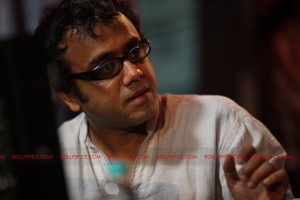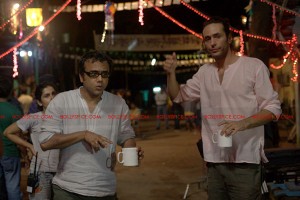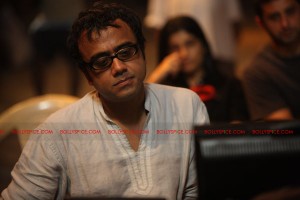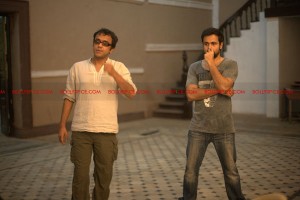 It can be said of Dibakar Banerjee that he is one of the best avant garde filmmakers in India and his films are never a typical filmi romance. From his debut film, the fabulous Khosla Ka Ghosla, to his cool Oye Lucky Lucky Oye, to the voyeuristic, digicam shot Love Sex Aur Dhoka, each film brings a topic or style we have never seen before. On Friday, we will see his next offering, Shanghai. The film stars Emraan Hashmi and Abahy Deol as we never have seen them before plus Kalki Koechlin in a performance the director says is the the best actress has ever given. Adapted from the 1960 Russian novel Z by Vassilis Vassilikos, this political thriller/whodunit, has been updated to a modern Indian story and town. The story is deep and complex so here is a synopsis to shed some light on the story before we hear from the director:
It can be said of Dibakar Banerjee that he is one of the best avant garde filmmakers in India and his films are never a typical filmi romance. From his debut film, the fabulous Khosla Ka Ghosla, to his cool Oye Lucky Lucky Oye, to the voyeuristic, digicam shot Love Sex Aur Dhoka, each film brings a topic or style we have never seen before. On Friday, we will see his next offering, Shanghai. The film stars Emraan Hashmi and Abahy Deol as we never have seen them before plus Kalki Koechlin in a performance the director says is the the best actress has ever given. Adapted from the 1960 Russian novel Z by Vassilis Vassilikos, this political thriller/whodunit, has been updated to a modern Indian story and town. The story is deep and complex so here is a synopsis to shed some light on the story before we hear from the director:
Synopsis:
A small town somewhere in India is poised to become the next Shanghai. Billions of dollars are being poured into an upcoming International Business Park. On the eve of its launch, a drunk truck driver mows down a prominent social activist. A lone girl believes it to be a murder, and is supported in her beliefs by a porn film maker who claims to have the proof that will bring the government down. A high ranking bureaucrat is brought in to investigate the accident. The movie follows the journey of these unlikely heroes as they come together to find justice in the labyrinth of Indian democracy.
Check out what Dibakar Banerjee had to say about Shanghai, the adaption for the film, Emraan and Abhay’s transformation, Kalki’s incredible performance and much more!
What attracts you to the stories you want to tell on screen?
Well, I have no idea what attracts me. I guess my mental makeup, the way I am, I guess things that make me, the lives I lead, that’s all. I mean what you see on screen, any film of mine, like any other director, it’s an expression of what that person is like. So I really can’t say why I am like what I am because like all of us, I am an accident of birth. I never chose to be like this, so, I don’t know. I’m being myself. One thing I do is that I make films that are a direct extension of what I’m thinking rather than pretend to be something else than what I am.
You chose to adapt the novel ‘Z’. How have you translated that to the Indian context?
The fact is that we completely changed the political aspect of the film because the book was based on the 1960’s Greece and at that time communism, capitalism and all those things were really big. Right now in India those issues are non-existent. Right now in India the political issue is about what is development – what is not. Who is rich, who is poor, how can the poor become rich, how can the rich become richer; these are the issues that are facing us. Our politics also is actually kind of following these issues and these guidelines. All these issues, which are the current crop of the Indian political polarization of the Indian political field, all these issues are what we changed the adaptation into. In addition to that we basically stuck to the frame of the elements of the story, but the climax and the 2nd half are totally new and totally different from the book.
Why the title Shanghai?
Well, because it alludes to a certain factor of the story where there is an Indian town, which is gaining up for a huge amount of investments in the aim of becoming a major economic zone. It dreams of becoming very, very forward looking, very, very vibrant, extremely developed and upwardly mobile city in no time at all. The example of China and the example of Shanghai is taken as THE example of trade hub of a very, very forward, rich market, economy oriented city, which competes with the West and which attracts investments from the West. So Shanghai has become kind of a touchstone for much of the political debate around development that goes around in India. Many politicians have actually promised that they will make this city as Shanghai or that city into Shanghai or whatever it is. It’s all is defined by that yardstick. So which is why this story, which is a thriller, is set in a city which is about to explode into a development haven, in terms of getting a lot of money and getting a lot of investments. So the backdrop of the thriller is the city and that’s why I wanted to call it Shanghai.
Emraan is playing a totally different character in this one. Can you tell us how you worked with him to make that character come to life?
It actually came to life because of Emraan’s interest in trying to do something totally different. When I read out the script to him he said, ‘I am doing it!’ He was on in five minutes – that’s how much he was interested in doing the character, because the character of Joginder Kapoor is one of the most fascinating characters that actually even I have encountered in any of my films. It starts off by being this almost amazingly comic character and it goes through a change and an evolution and he becomes a character that you just fall in love with in the end. When I narrated the character to him, Emraan was completely into it and said ‘I want to do it.’ But then he said, ‘If I look like the way I look, which is essentially the way I have looked in my past films it’s not gonna work because I’m going to look like Emraan Hashmi and I’m going to look like all those characters in all those different films that I’ve done. This is totally different as a film therefore I have to look totally  different’. And I said, ‘That’s what I had exactly in mind. He is this small town, sleazy, extremely slick street-smart kind of fixer kind of a guy and I want you to have that look. I want you to gain a lot of weight because probably you (Joginder) were well built at one time but now you are out of condition so I want you to get a paunch. You move on the street most of the time so you are burnt brown. You are a small town guy so you have to dress like that and you should look a guy from the street; an average Joe from the street.’ Emraan just went for it and said give me as much of that flavor and action that you want. Then he came up with this idea to stain his teeth slightly brown because he chews tobacco or smokes a lot. Just completely putting it away from his cool, lover boy, glamorous image and that really worked.
different’. And I said, ‘That’s what I had exactly in mind. He is this small town, sleazy, extremely slick street-smart kind of fixer kind of a guy and I want you to have that look. I want you to gain a lot of weight because probably you (Joginder) were well built at one time but now you are out of condition so I want you to get a paunch. You move on the street most of the time so you are burnt brown. You are a small town guy so you have to dress like that and you should look a guy from the street; an average Joe from the street.’ Emraan just went for it and said give me as much of that flavor and action that you want. Then he came up with this idea to stain his teeth slightly brown because he chews tobacco or smokes a lot. Just completely putting it away from his cool, lover boy, glamorous image and that really worked.
Then you also have Abhay Deol who is playing someone completely different as well. Can you tell us about working with him on that character?
First of all he had to work on the language because in India it’s accents that define you. Abhay is playing a Tamillian Brahmin from South of India who is extremely conservative, correct and extremely powerful civil servant. This is different from whatever he’s done earlier because he has all been a bit of a boy before. Whether as Lucky, whether it’s Dev.D – he’s been contemporary, he’s been young, he’s been cool and he’s been rebellious. This time he’s playing conservative, he’s playing very much the establishment, he’s playing powerful, he’s playing focused and he’s playing slightly older than his age. So all these things attracted Abhay immensely because it was totally against his image so far. Anything new attracts actors. That is how it started and then he got into this rigorous schedule of learning to speak in this Tamil accent in Hindi and English and learning to speak Tamil itself. He really went through a rigorous coaching. Many people who’ve heard this accent in the film they said it was the most authentic. It is non-spoofy, you know, he could have gone into camp and spoof very easily but he has done such a natural accent. I mean after a while you forget that he’s putting on an accent. It’s that natural. And that took a lot of effort.
Talk to us about Kalki’s role and working with her.
I think this is Kalki’s best performance of her life from whatever I’ve seen of the film. It’s the most emotionally and physically challenging role that she’s ever done. She is practically there in every frame of the film. She’s not the typical leading lady Hindi heroine whose job is to just to make the hero look good. She’s taking the story forward and she’s actually shouldering the weight of film and the narrative along with the two main leading men. Her character goes through amazing amounts of ups and downs. She is the foremost element in terms of trying to unravel the mystery that lies at the core of the story of Shanghai. In many ways it’s a whodunit, it’s a chase, it’s a thriller, and in many ways Kalki is like the crime detective who is actually trying to tell people that look this is not what happened. Looks can be deceptive. Look deeper. Something is wrong here. I’m telling you something is wrong here. And it’s her efforts at blowing the thing apart that actually takes the plot forward. She’s running, she is hunted, she is hunting, she’s beating a guy to pulp, she’s sometimes jumping from one roof to another. It’s crazy! The kind of things she’s done in the film, it’s the most emotionally and physically challenging role that anybody can have. She pulled it through by sheer grit, by strength of character, and it was something else.
 I love the music of Shanghai. Can you tell me a little bit about creating the vibe and the sound of the music for the film?
I love the music of Shanghai. Can you tell me a little bit about creating the vibe and the sound of the music for the film?
The thing is with Shanghai we were very sure that the sound of Shanghai had to be an integral part of the storytelling. When you listen you would hear the Bombay beat, the street drums, they are so throbbing, they are so alive so electric. And in Bombay, our institute of India, anything that happens, whether it’s political or religious or personal, it can be a marriage, it can be a rally, it can be religious occasion, it can be anything you get out on the street and you have all these street bands and you go from street to street playing this endless music telling everybody to start partying with you. When I spoke to Vishal Shekhar I gave them the brief that ‘Bharat Mata’ had to breathe of an Indian street song. After 3 weeks of air play it’s now on the top 10 on radio playlists.
Two of my favorites are ‘Dua’ and ‘Khudaya’.
Absolutely! Usually most albums have just one or two songs and the rest of them are quite interchangeable and they are there just to fill in the space. This album has five beats, there is ‘Bharat Mata’, there is ‘Khudaya’, there is ‘Dua’, there is ‘Imported Kamariya’, so it’s like quite that. ‘Morcha’ is literally the street sound of India.
What do you hope audiences will take away with them after seeing Shanghai?
I think the audiences will carry away the fact that probably that one of the most exciting places in the world today is India, which is at crossroads and the choices that we make as people will affect that. You know, the character of Abhay, the character Emraan and the character of Kalki actually represents the cross section of the Indian population. And every person in the audience is going to identify with one or the other of these three characters. In between the three of them they encompass India. They will probably think about the choices that these three characters in the film made because in the film these characters are forced to make choices, which makes the story go forward. The audience is going to walk out and think about the choices the three characters made and think right now the choices we make is going to define the future of India for the next half a century. The thing about choices is that because then they can think about where India can go. That’s the best that I can hope for.
Shanghai hits theaters on June 8th!









